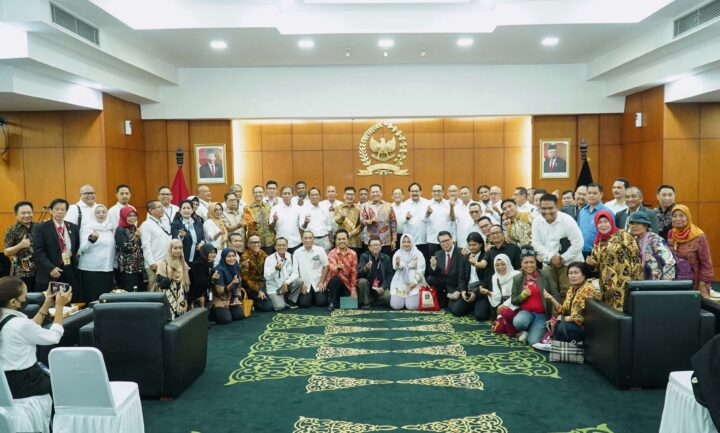
Bambang Soesatyo, Chairman of the MPR RI and Head of the Law Enforcement, Defence and Security Relations Board of Kadin Indonesia, revealed that there is a close relationship between the Four Pillars of the MPR RI (Pancasila, 1945 Constitution of the Republic of Indonesia, NKRI, and Unity in Diversity) and the business world. This can be seen from the formation process of Law No.1/1987 on the Chamber of Commerce and Industry (Kadin).
In the law, it is explained that national development, especially in the economic field, is carried out by creating a healthy business environment, improving business development, and encouraging the participation of as many business people as possible, taking a foothold on Pancasila and the 1945 Constitution of the Republic of Indonesia.
"The synergy between business sectors, involving state/regional-owned enterprises, cooperatives, and the private sector organised by Kadin, is directed at achieving equitable distribution of people's welfare, strengthening national unity, and enhancing national resilience. This is in line with the idea of NKRI as the meeting point of national solidarity, and Bhinneka Tunggal Ika as the glue in the nation's diversity," Bamsoet said at the Socialisation and Discussion of the Implementation of the Four Pillars of the MPR RI for the Business World, organised by the MPR RI in collaboration with the Indonesian Kadin's Law Enforcement, Defence and Security Relations Agency at the MPR RI Building, Jakarta, on Monday (7/8/23).
Kadin Indonesia Chairman Arsjad Rasjid, as well as KADIN Indonesia Deputy Chairman for Organisation, Law, and Communication Yukki N. Hanafi, and Deputy Chairman for Law and Human Rights Dhaniswara K. Hardjono, attended the event.
Bambang Soesatyo explained that the values contained in the Four Pillars of the MPR RI have an important meaning to encourage businesses to build national economic resilience, increase global competitiveness, and protect the country's economic interests. This also includes dealing with issues such as labour, social conflict, environmental damage, and dependence on external parties.
As outlined in Article 33 paragraph (1) of the 1945 Constitution, Indonesia's national economic system is a distinctive economic system that is different from the two economic poles that have become global dominance. Indonesia's economic system is not a socialist economic system, where the state is the main actor in the economy. Likewise, Indonesia's economic system is not a capitalist economic system, where individuals and markets have a dominant role in determining economic behaviour.
"Our economy is a Pancasila economic system, which integrates the values of Pancasila in the management of the country's economy. This system relies on values such as religiosity, humanity, nationality, democracy, and social justice," Bamsoet explained.
Bambang Soesatyo explained that Kadin, as a forum for business people and a strategic partner of the government in economic development, has an important role in making the values of the Four Pillars of the MPR RI as business ethics.
"The principles of business ethics that are the foundation for companies and businesses today, such as accountability, integrity, responsibility, transparency, fairness, loyalty, and environmental care, all come from the values in the Four Pillars of the MPR RI. Ethics in the nation, including ethics in economics and business, are so important that the MPR has issued MPR Decree Number VI of 2001 on the Ethics of National Life. This decree is one of the MPR Decrees that remains in force until a law is formed," he explained.
Bambang Soesatyo also appreciated the contribution of the business world in national economic growth. Economic growth in the first quarter of 2023 reached 5.03 per cent. This figure not only exceeded the expectations of many parties, but also occurred in a situation of global economic slowdown. Some developed countries even recorded economic growth below 2 per cent. Examples are the United States with economic growth of 1.6 per cent, Japan 1.3 per cent, and Singapore 0.4 per cent.
"The inflation rate has also continued to decline. In July 2023, the inflation rate reached 3.08 per cent, down from 5.28 per cent at the beginning of the year. A good sign for the business world also came from the realisation of investment in the first quarter of 2023 which reached Rp 328.9 trillion, which also contributed to creating jobs for more than 384 thousand Indonesian workers. This has an impact on reducing the unemployment rate," Bamsoet concluded.
National Economy
Regional Economy
National Economy
Regional Economy